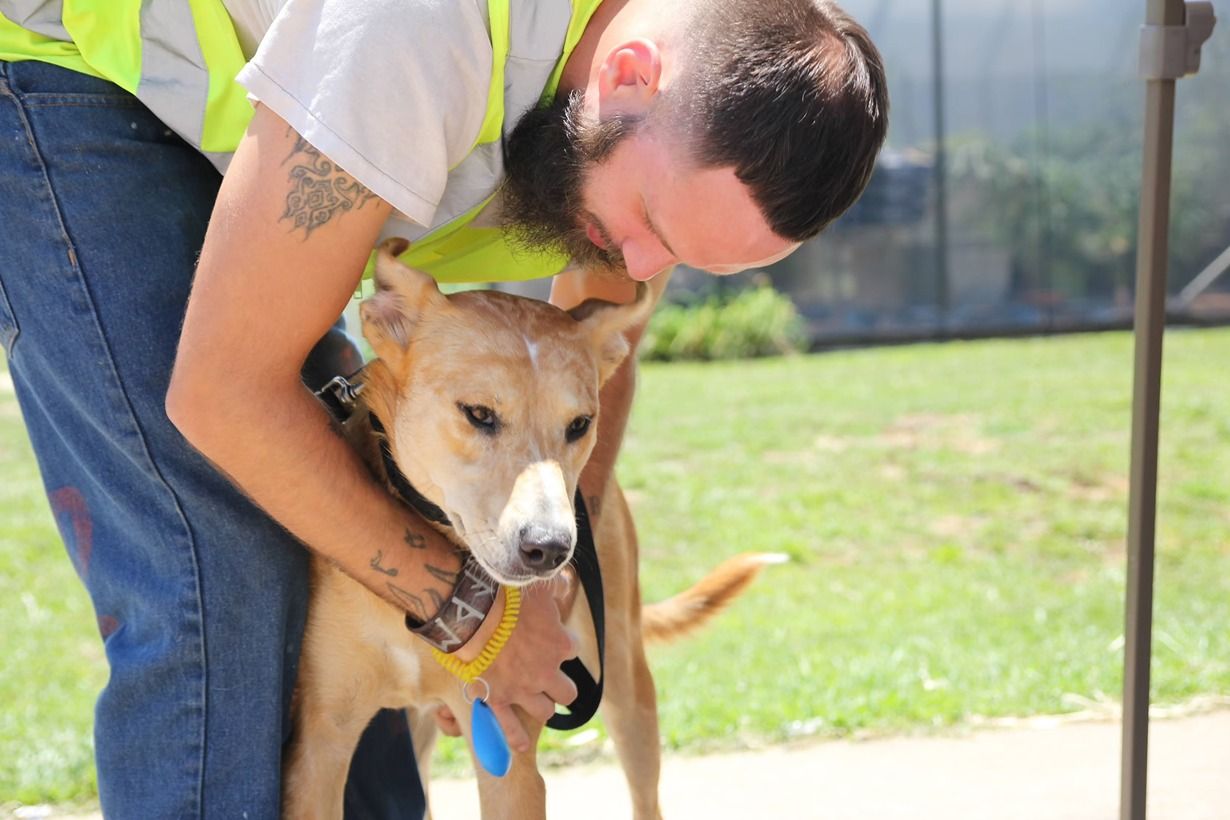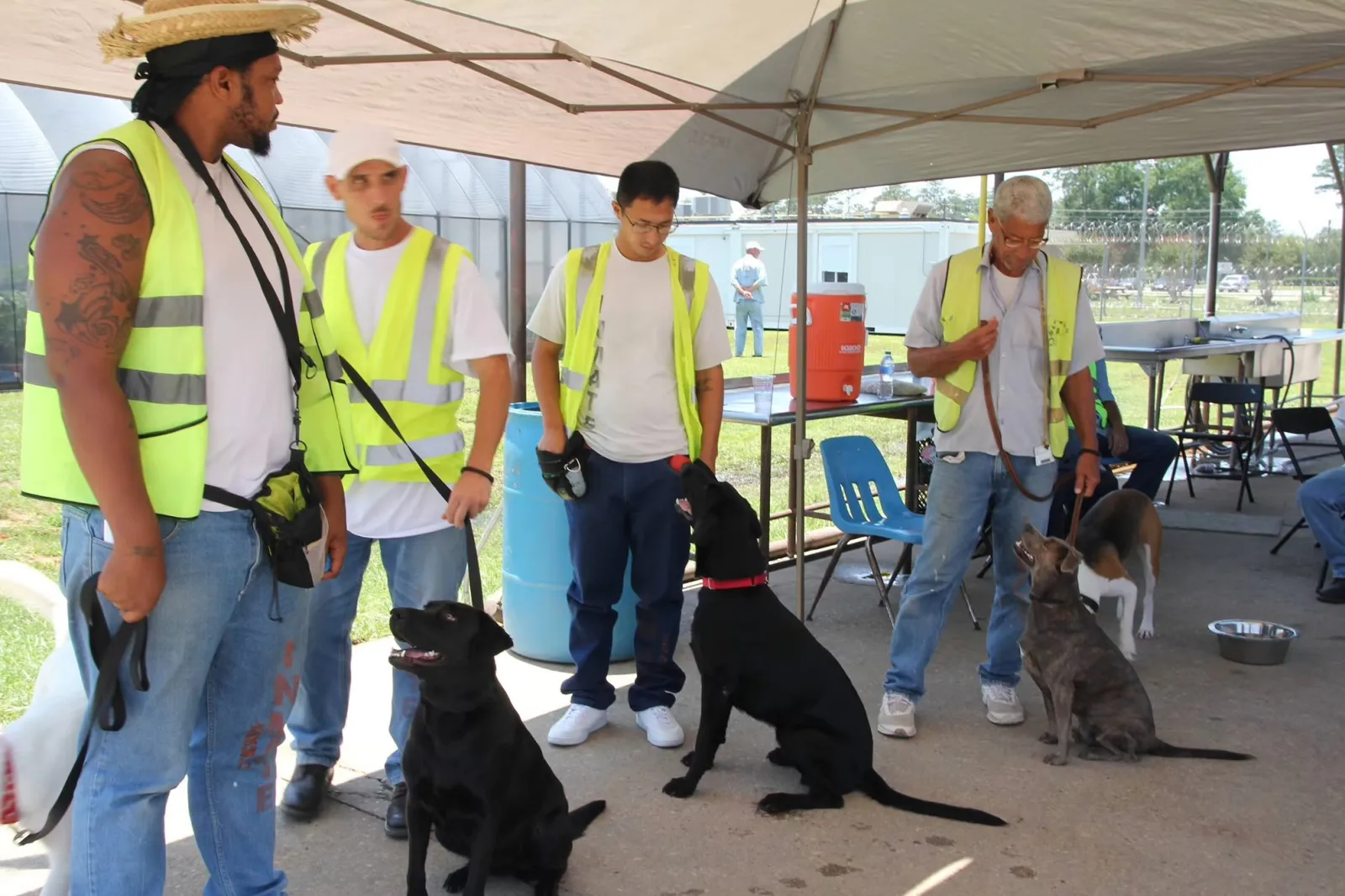The Canine Redemption
Outside of mainstream society, some animals are getting a second chance at life from behind prison walls—and so are their inmate trainers.
Louisiana's public animal shelters and nonprofit shelters are overwhelmed and have been at crisis levels for years. The situation is dire for many dogs and cats who are euthanized to make room for more animals coming in every day. While mass transportation programs to northern states with fewer animals in shelters (thanks to robust spay/neuter programs) are able to save some lives, too many adoptable animals are sentenced to an undeserved death.
Since 2005, Dixon Correction Institute, a medium security state prison in Jackson, Louisiana, has taken in cats and dogs that have nowhere else to call home. The Pen Pals shelter has provided a safe haven for animals and has improved the lives of inmates trained to care for them. The shelter began in the immediate aftermath of Hurricane Katrina as pets were left behind by evacuating citizens. People who rounded up these abandoned animals needed somewhere to take them, so a makeshift shelter was created at Dixon Correctional.
The shelter turned out to be a success for the animals and for some inmates who were allowed to tend to them. Eventually, DCI, the Humane Society of the United States, and the LSU School of Veterinary Medicine established a permanent and emergency animal shelter on the prison grounds, with the Humane Society obtaining a $600,000 grant for construction of the facility.

PEN PALS
Pen Pals, Inc., Dog and Cat Shelter and Adoption Center is a beacon for hope for the animals saved and for the inmates. The program not only provides much needed shelter for animals in Louisiana, but it helps the inmate workers learn skills that can be used after reintegrating into society and promotes their rehabilitation.
Trained dogs are more likely to be adopted. From the Big House to Your House by Doggone Express is an organization dedicated to training inmates to train dogs in order to get them adopted out. The program's founder and CEO, William Barse, was inspired by the Pathways to Hope program. "I was helping several rescues back in 2009, and people would say that they would love to have a dog, but they couldn't afford to have it trained," he relayed. "I found a Dominican nun, Sister Pauline Quinn, who had inmate dog training programs, and I was able to go visit them. I worked with my executive vice president, who happened to be an attorney/judge who owned a pet store, and we got a meeting with Secretary LeBlanc in charge of safety with the Department of Corrections, and we told him this is what we wanted to do. We launched it on May 1 of the following year."
From the Big House to Your House
Just over a decade later, From the Big House to Your House has saved more than 770 dogs from kill shelters in Louisiana, trained them at Rayburn Correctional and the Louisiana Correctional Institute for Women, and placed them in loving homes.

C.A.T.S. train Dogs
Dogs are selected from kill shelters or from rescue organizations that pull dogs from kill shelters, and they are matched with the programs trained Canine Assessment Training Staff.
"I'm the only person on the planet that has C.A.T.S. training dogs in prisons," Barse laughingly said. "The C.A.T.S. are training the dogs in name recognition, 'recall,' 'sit,' 'stay,' 'leave it,' 'drop it,' and 'place,' where they send the dog to a specific area and [it] lays down until it's given a release command. The dogs stay in a kennel under the cots of our trainers. That's quite an honor to be in the program, and we've had quite a few people who got out of prison when their time was up, and two became dog trainers. We have no recidivism. No one who has been in our program who got paroled or let out has gone back to prison."
Some dogs who excel at basic obedience will go on to receive advanced training for skills such as emotional support or assistance with tasks. "There's more advanced training, which includes 'cover,' 'block,' and 'distress response,' which, in the event the owner has an emotional situation, the dog will crawl up on the owner and lick them under the chin until they come back to the present," he said. "We also have night-situation training where if an owner is having nightmares, the dog will wake up the owner. We can train them more advanced to pick up items, retrieve items by name, and assist with people who may be confined to a wheelchair."
A Prisoner's Best Friend
Barse emphasized that they can't train enough dogs to meet the demand he receives for them, and there's a waiting list for these prison-trained dogs. Due to the program's success for shelter animals, inmates, and the citizens receiving dogs, it will expand to more institutions. "We're getting ready to expand our prison training programs to Elayn Hunt Correctional Center in St. Gabriel and Allen Correctional Center in Kinder," Barse acknowledged. "We're hoping to be able to introduce some programs at two jail facilities. I'm a deputy with the Washington Parish Sheriff's Department, and I'm working with the director of corrections at the jail to have some of those inmates work at two of the shelters up here where they can also learn, hopefully, conflict resolution, anger management, and responsibility."
Prison pet programs are beneficial to all parties involved, and these furry friends would love to come home to you. As Barse put it, "We convert inmates from tax users to tax payers. Overall, everyone wins. There's no way that this cannot help the community."

